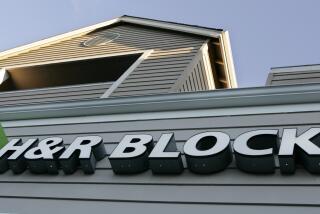H&R; Block Seeks to Reverse Its Record in Diversification
- Share via
It’s tax season again, and that means about 16 million Americans will head to H&R; Block Inc. for help with their income tax forms. But Block’s stockholders could use help with their returns as well.
Investment returns, that is. Block’s stock price has languished in recent years, even though Block enjoys such assets as a trusted brand name, a strong balance sheet and steadily growing, if unspectacular, earnings from its basic tax-preparation business.
The main problem: Block is again moving into non-tax markets in a bid to pump up its earnings growth, and in light of Block’s checkered past with diversification, that makes Wall Street nervous.
“Investors are taking a wait-and-see approach,” said Mark Miller, an analyst at Merrill Lynch & Co.
But not all of them. Harris Associates in Chicago, a money-management firm and advisor to the Oakmark family of mutual funds, has placed a huge bet that Block’s effort will pay off.
Harris has amassed 10 million Block shares in the last 12 months, or 10% of the company, on behalf of Oakmark and others. That’s more than twice as big as the 4.4% stake held by Block’s 76-year-old founder, Henry W. Bloch.
“We think Block is sorely undervalued” on the market, said Harris analyst Henry Berghoef, and a key reason is Block’s mixed track record with diversification.
“They’ve tried a lot of things in the past; some have worked, some haven’t,” he said.
Block is the king of affordable tax help. Last year, it prepared 14.8 million U.S. individual income tax returns through its 8,780 owned or franchised offices--or one out of every seven filed with the Internal Revenue Service.
An additional 1 million taxpayers used Block’s offices just to electronically file their returns. The Kansas City, Mo.-based company also has 1,350 other tax-preparation offices in several foreign countries, including Canada and Australia.
Block’s core audience is low- and middle-income taxpayers and those with simple returns, and the average fee for a basic return is $80. But Block has managed to keep lifting the fee each year--it was $52 in 1992--without turning off its customer base.
Block was founded 44 years ago by Henry Bloch and his brother, Richard, who changed the spelling of the company’s name to end with “k” rather than “h” to avoid mispronunciation. The company grew steadily with the help of the earnest-looking Henry Bloch peddling its services on television.
(Henry Bloch remains H&R; Block’s chairman but isn’t involved in its daily operations.)
Tax preparation accounts for more than 80% of Block’s earnings, and nearly all of the profit comes in its fiscal fourth quarter ending April 30, during tax time. And they’ve grown at a double-digit rate for the last three years. Overall, Block earned $174 million from continuing operations in fiscal 1998, on revenue of $1.3 billion.
But that also means Block’s offices are empty most of the year. So the company has diversified several times in an effort to enhance and smooth out its growth.
This time, Block wants to build a larger financial-services company around its tax business, so it’s been buying up mortgage providers, financial planning firms and accounting firms. One of its major acquisitions was Option One, a Santa Ana-based mortgage broker with 5,000 offices nationwide.
The potential is obvious: Block knows all those millions of tax customers will be sitting in their offices this spring, so why not interest them in a mortgage, investments or financial planning? It’s a familiar “cross-selling” technique that’s been used for years by major banks.
“I’ve always looked at our [tax office] network as an opportunity that was not being taken advantage of,” Block Chief Executive Frank Salizzoni said in a telephone interview. “They sit idle, essentially, for eight or nine months of the year.
“I felt that if we could sell the other services to our clients . . . it would help our tax business because it would help improve the retention of tax clients and make us some money in the off-season,” Salizzoni said.
Block is also expanding beyond its traditional customer base by offering premium services--at nicer offices--to those with fatter paychecks. Those clients generate an average fee of $160 per return, or twice the norm.
But Salizzoni is moving carefully. Some of Block’s new services, such as financial planning, are being tested in just a few cities. So the full impact of the new lines on Block’s performance won’t likely be known until 2000 at the earliest, which also gives Wall Street pause.
“Can they execute well? That’s the big question,” said Alexander Paris Jr., an analyst with Barrington Research in Chicago.
Then again, Block had to do something, Paris said. The tax business can give Block 15% annual earnings growth for perhaps two more years, “but beyond that, its core business will not support” that kind of growth, Paris said.
And management is under pressure to help the stock. Block’s shares have traded lately between $40 and $45 a share--the same price range as five years ago, while the stock market overall has nearly tripled in value over that period. The stock closed Thursday at $42.38 a share, up 19 cents on the day, in New York Stock Exchange composite trading.
Block’s lackluster stock shows that “investors are sitting on the sidelines and watching” Block’s latest diversification moves, said Jordan Horoschak, an analyst with Standard & Poor’s Corp. in New York. “They remember CompuServe.”
Block acquired CompuServe in a diversification move in 1980, and for years the online service turbocharged Block’s earnings. But by the mid-1990s, CompuServe had lost its edge and was getting clobbered by ferocious competition from America Online Inc.
CompuServe never recovered, and Block finally sold its remaining 80% stake in the company a year ago to what is now MCI WorldCom Inc. for about $1 billion, and MCI WorldCom then split CompuServe’s assets with AOL.
Block also has struggled with a credit card operation that’s losing money, so it has “a once-bitten, twice-shy mentality when it comes to diversifying,” Horoschak said. “I’d like to see management be more aggressive.” (Block last month agreed to sell the credit card unit to Providian Financial Corp. for an undisclosed price.)
Salizzoni defended Block’s pace. “If we were to roll this out too fast, and it didn’t work, we would have wasted a lot of the stockholders’ money,” he said. “We want to make sure we can execute and that our customers want these services.”
Also, Block recently hired Mark Ernst, a top executive at financial-services giant American Express Co., to be its chief operating officer. He’s not only a key player in Block’s expansion plans, he’s also a likely candidate to be chief executive one day.
But in the meantime, he and Salizzoni will be under scrutiny by big stockholders such as Harris Associates.
“If they can figure out ways to use those offices better the other nine months out of the year, that’s great,” said Harris analyst Berghoef. “But you don’t want to go too far afield. I would much rather see them stick to the tax business.”
(BEGIN TEXT OF INFOBOX / INFOGRAPHIC)
Blocked Returns
H&R; Block’s stock is trading in the same range it was five years ago, while the stock market overall has nearly tripled in value during that time period. Monthly closes and latest on the NYSE:
January 1994: $43.88
Thursday: $42.38, up 19 cents
Source: Bridge
More to Read
Inside the business of entertainment
The Wide Shot brings you news, analysis and insights on everything from streaming wars to production — and what it all means for the future.
You may occasionally receive promotional content from the Los Angeles Times.











